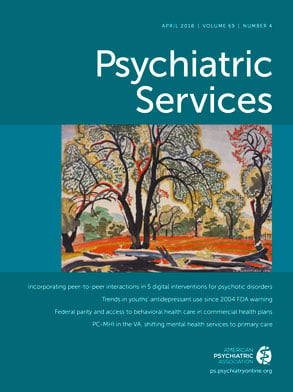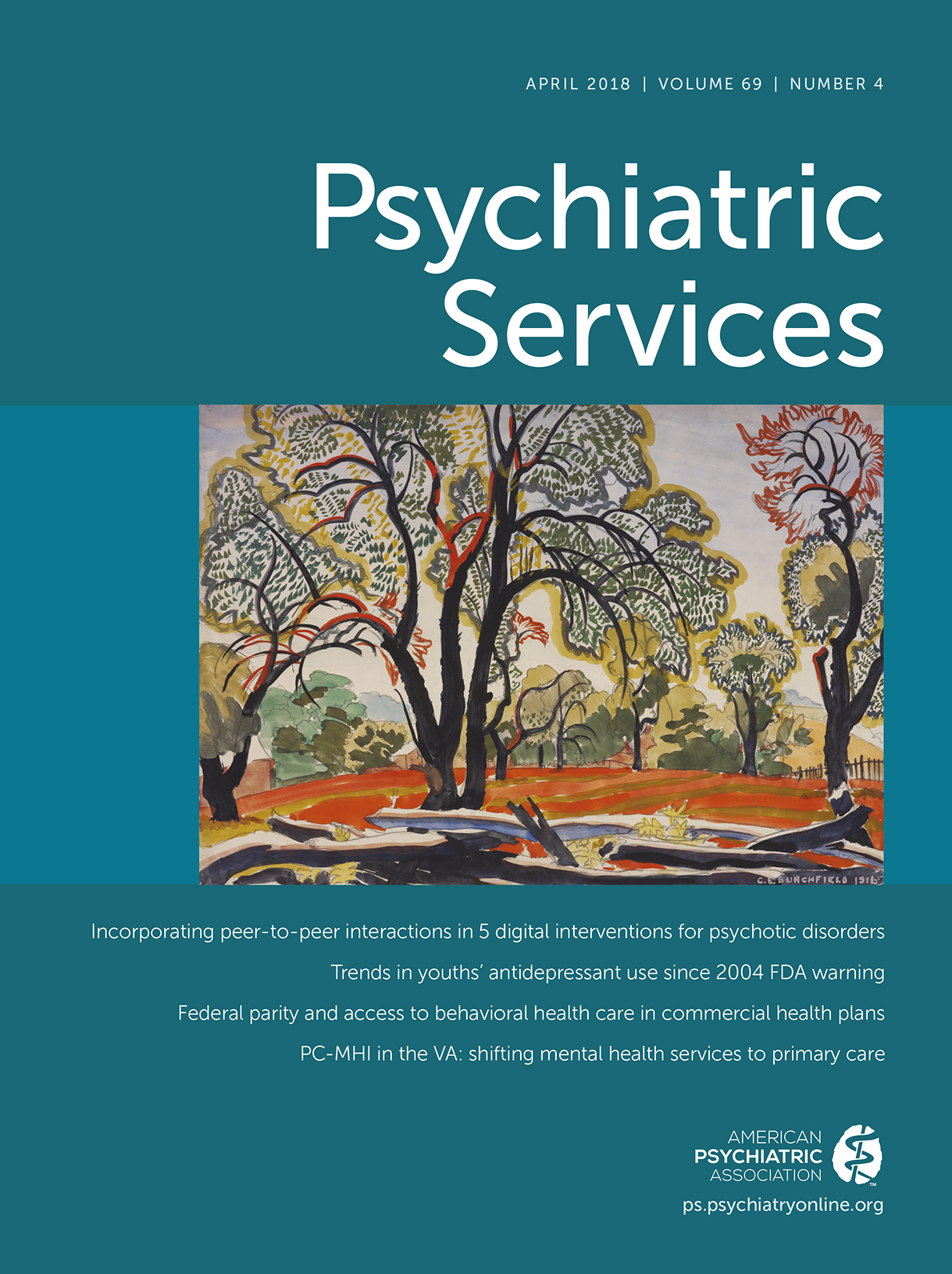Poor access to care has been cited as a possible risk factor for the increased morbidity and mortality among individuals with serious mental illness (
1,
2). Studies have indicated that individuals with serious mental illness are less likely than the general population to receive appropriate general medical care (
3), and they are more likely to experience care delays because of various barriers (
3,
4). Studies also indicate that both structural barriers and personal factors contribute to treatment delays, although the relative importance of these factors varies depending on the study (
4–
6). However, the studies are consistent in highlighting the adverse health outcomes associated with delays in receiving medical care as a result of these barriers.
Past research has rarely examined the association of care delays with metabolic abnormalities and other biological markers. This study sought to address this gap in research by examining relationships between delays in general medical care and elevated blood pressure, hemoglobin A1c (HbA1c), and lipid levels among patients drawn from two inner-city outpatient psychiatric clinics.
Methods
Participants with serious mental illness were recruited from new admissions to two inner-city outpatient mental health centers between 2008 and 2012. Given the focus on individuals with serious mental illness, only adults with diagnoses of primary psychotic illnesses as well as severe mood disorders with psychosis were included. Diagnoses and medication lists were extracted from existing medical records. The study sample has been described in detail in past reports (
4,
7,
8). All participants provided written consent, and the study was approved by the Institutional Review Board of the Johns Hopkins Bloomberg School of Public Health.
Similar to procedures in our previous study (
4), delays in seeking medical care over the past 12-month period were assessed by using seven items, five of which were derived from the National Health Interview Survey, including questions about delaying care because of trouble reaching providers via telephone, inability to secure a timely appointment, trouble with transportation, prohibitive hours of service, and having to wait too long after arrival. A question was added to assess care delay due to trouble with insurance or inability to afford care, and another question was added to assess whether the patient delayed seeking treatment because of concerns that having a mental illness would cause him or her to be treated differently from other patients. The questions were prefaced by the following statement and question, “There are many reasons people delay getting physical medical care. Have you delayed getting care for any of the following reasons in the past 12 months?” For this study, care delay was defined by an affirmative answer to any of the seven questions.
Trained study staff obtained blood pressure measurements. On the basis of a consensus report (
9), abnormal blood pressure was defined as a systolic reading of ≥120 mmHg or a diastolic reading of ≥80 mmHg.
Blood samples were obtained by certified phlebotomists at assessment. Abnormal HbA1c was defined by a level of ≥5.7 mg/dl, based on the 2003 American Diabetes Association criteria (
10), and abnormal lipid levels were defined by a level of ≥200 mg/dl for total cholesterol, ≤40 mg/dl for high-density lipoprotein (HDL), and ≥100 mg for low-density lipoprotein (LDL), based on the American Heart Association guidelines (
11).
Analyses were conducted by using logistic regression models in SPSS, version 23. In order to maintain consistency with prior outcome analyses (
4), we controlled for the same sociodemographic and clinical characteristics, although a few categories were collapsed because of smaller sample sizes for some analyses. Antipsychotic use was included in the models because these medications are associated with an increased risk of abnormal lipid levels (
12) and diabetes (
12,
13). We conducted separate analyses for each of the outcomes—elevated blood pressure, elevated HbA1c, total cholesterol, LDL, and HDL. Because of the large proportion of missing data on metabolic outcomes, these analyses were conducted by using multiple imputation of missing data (100 imputed data sets) (
14).
Results
A total of 271 (31%) of the 874 patients approached by study staff consented to participate and were enrolled. Of those, 169 (62%) reported a delay in seeking general medical care in the past 12 months. [A table summarizing the percentage of participants who endorsed each of the barriers is available as an online supplement to this article.]
Fifty-three percent (N=144) of the participants were female, 54% (N=147) were black, 34% (N=91) were white, and 12% (N=33) were from other racial-ethnic groups. The mean age was 42±11 years (range 19–66). Schizophrenia was the primary diagnosis for 33% (N=89) of the sample; 60% (N=163) of participants were diagnosed as having a mood disorder with psychotic features, and 7% (N=19) were diagnosed as having a psychotic disorder, not otherwise specified. Thirty-three percent (N=88) of participants had less than a high school diploma, 38% (N=102) had a high school or equivalent diploma, and 30% (N=81) reported some college. Eighty-six percent (N=232) identified a usual source of primary care.
Blood pressure data were available for 75% (N=203) of participants; lipids data, for 42% (N=113); and HbA1c data, for 39% (N=105). Blood pressure was abnormal among 131 (65%) participants. An abnormality in any of the three lipid measures was noted for 88 (78%) participants, and an abnormality in HbA1C was noted for 38 (36%) participants. Of the 271 participants who responded, 46% (N=125) reported having been told by a physician at one time that they had hypertension, and 18% (N=48) reported having been told that they had diabetes. Fifty-eight percent (N=157) reported taking an antipsychotic medication.
Medical care delay was associated with abnormal blood pressure (adjusted odds ratio [AOR]=2.14, p=.029) (
Table 1). Blood pressure was less likely to be abnormal among females (AOR=.38, p=.018) and among participants who identified any source of preventive care (trend level significance). Abnormal blood pressure was more common among participants who reported having a high school diploma compared with those with less than a high school education (AOR=2.43, p=.027).
Medical care delay was also associated with abnormal HbA1c (AOR=3.18, p=.026) (
Table 1). HbA1C was less likely to be abnormal among participants who reported having a source of preventive care, significantly so if that source was a public clinic (AOR=.06, p=.008). The association of care delay and abnormal HbA1C was similar in complete-case analyses (AOR=3.42, 95% confidence interval=1.01–11.56, p=.048) [see supplement for results of complete-case analyses]. Medical care delay was not significantly associated with abnormalities in lipid markers.
In further analyses, we also tested the interaction term for delay in general medical care with self-reported diagnosis of hypertension in the analyses for abnormal blood pressure and the interaction term for medical care delay with self-reported diagnosis of diabetes in the HbA1c analyses. Neither of these interaction terms was statistically significant, indicating that the association of care delay with the biological markers did not vary according to the presence of these disorders.
Discussion
To our knowledge, this study is among the few to examine the association of delay in seeking general medical care with clinically used biological markers among individuals with serious mental illness. Research on care delays has mostly examined associations with self-reported outcomes (
4) or focused on the care barriers themselves (
3,
5,
6). However, objectively measured markers may be more relevant for assessing the health impact of delays in receiving medical care.
Medical care delay is common among individuals with serious mental illness (
4) and may explain the increased morbidity and mortality in this population. In this study, almost two-thirds of the participants reported a delay in seeking general medical care. Supporting our hypothesis, we found a significant association between self-reported medical care delay and two important clinical markers.
Hypertension is widely regarded as an important risk factor for cardiovascular disease, which remains the top cause of mortality in the United States (
15). We noted that the odds of having elevated measurement of blood pressure were more than double among participants reporting a care delay. Although two separate abnormal blood pressure measurements are required for diagnostic purposes, a single measurement by qualified staff can provide important clues to a person’s cardiovascular health (
9) and necessitates repeated follow-up screening and possibly other testing.
Elevated HbA1c has widely established links to diabetes, which remains in the top 10 causes of mortality in the United States (
15). We found that the odds of having an abnormal HbA1c result was over three times higher among those reporting a care delay. Abnormal HbA1c measurements would typically trigger repeated testing and possible initiation of treatment.
We found no significant association between self-reported care delay and lipid markers. We suspect that the nature of at least some of the blood samples, one of the study limitations discussed below, may have contributed to this finding.
The study’s limitations should be considered when interpreting the results. First, because of missing data, the sample sizes for metabolic measures were relatively small. This limited our ability to assess the association of delays caused by different barriers with the health outcomes. However, the missing data were a result of funding limitations in the latter part of the study, and there was no selection of participants for testing. Second, anecdotal reports from study phlebotomists suggest that a substantial proportion of participants did not fast prior to blood sampling, despite being provided instructions to do so, limiting the results of lipid analyses. Third, point-in-time measurements rather than serial measurements were used, limiting the utility for diagnostic purposes. Fourth, the self-report portions of the data may have introduced recall and social desirability biases, for example, in reporting barriers. Fifth, unmeasured factors, such as poverty and difficulty in accessing healthy food, may have confounded the relationship of medical care delays with outcomes. However, the sample was drawn from the inner-city community clinics, where a majority of patients have a very limited income and most are on public insurance. Sixth, including only new admissions might have limited generalizability of the results. Furthermore, only patients who consented to participate in the study and agreed to measurement of relevant biological markers were included, introducing possible selection bias. Finally, the study sample was limited to those with serious mental illness. The consequences of delays in care among other groups may be different.
Conclusions
The findings of this study expand our understanding of the consequences of delays in seeking general medical care in a vulnerable patient population. Such delays are common and are associated with poor self-reported (
4) and objectively measured health markers. By highlighting elevated levels of intermediate health markers for heart disease and diabetes, the findings of this study suggest a link between medical care delays and these disorders. That is important because these disorders are among the top causes of death in the United States and are potentially responsible for elevated morbidity and mortality among persons with serious mental illness (
1). Our findings also highlight the importance of provider awareness of potential barriers to care, given that most respondents identified having a source of regular medical care. We suggest that discussion of common care barriers be further integrated into routine health counseling.

